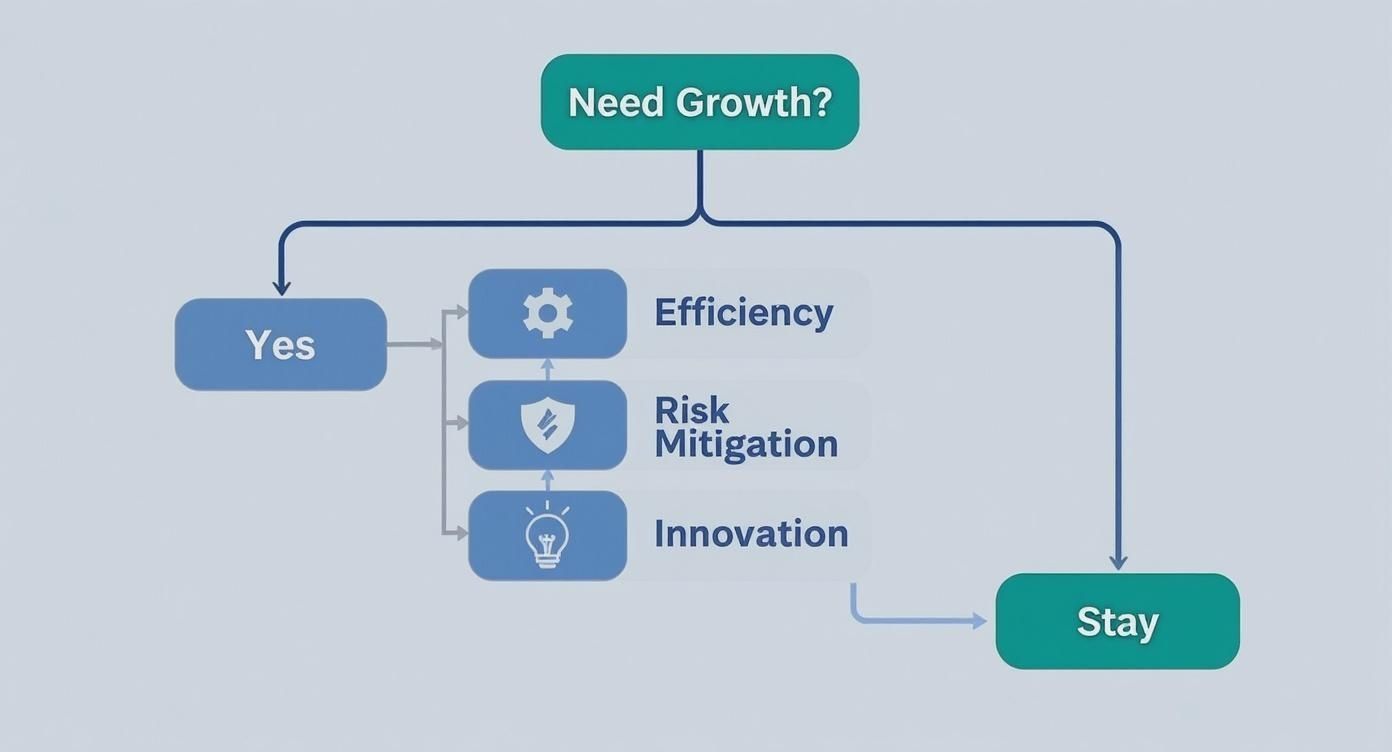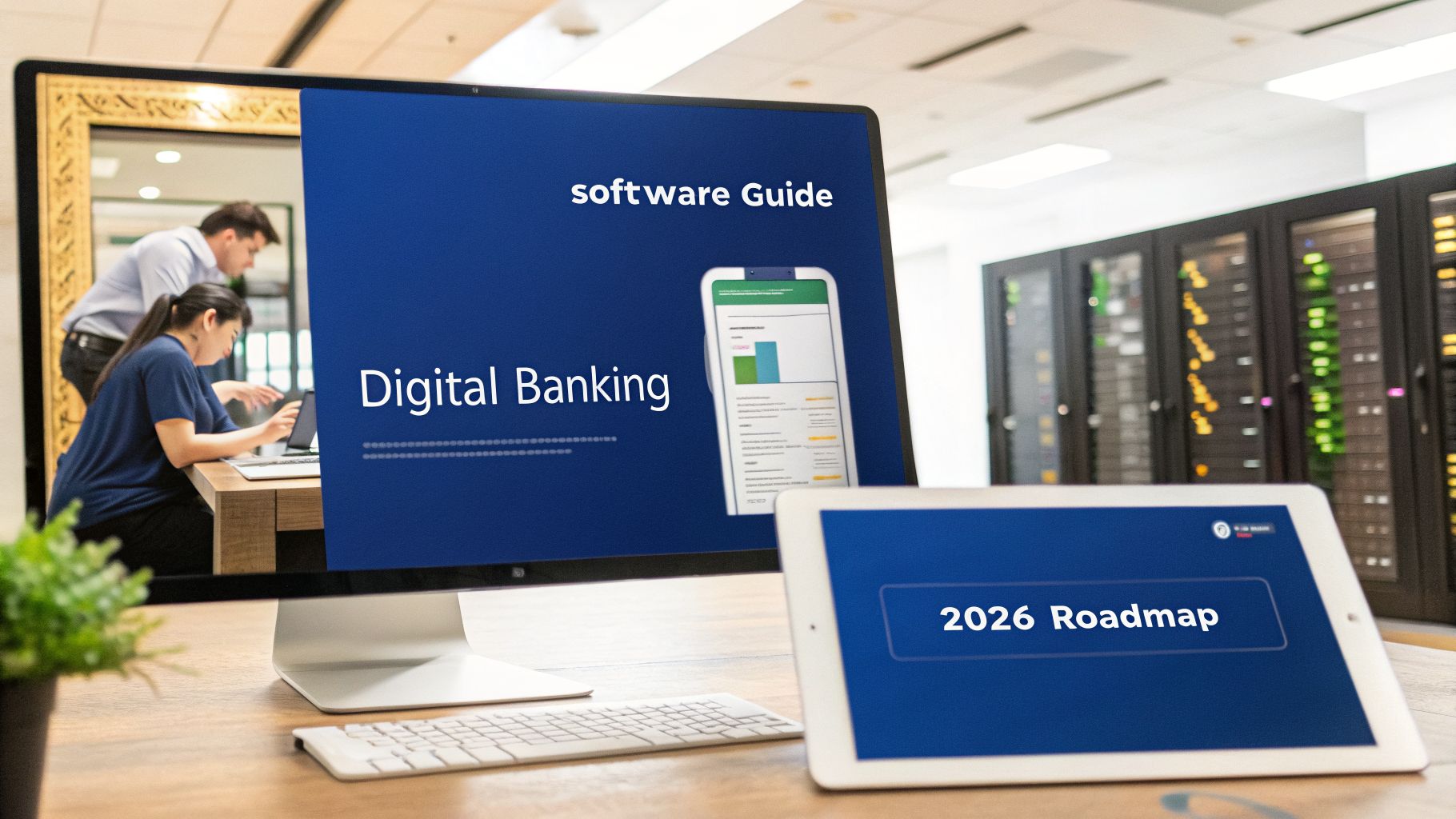Think of an IT consultancy service as a strategic partner for your business's technology. They're not just there to fix what's broken; they’re the architects who design a comprehensive blueprint to make sure your entire tech infrastructure is solid, efficient, and perfectly aligned with where you want to go.
So, What Does an IT Consultancy Service Actually Do?

Imagine an IT consultant as a seasoned guide for your company's tech journey. Their main role is to help you use technology to solve real business problems and hit your targets. They're the translators who can turn your ambitious business goals into tangible, effective tech solutions.
This kind of strategic guidance is more critical than ever. In fact, the IT consulting market in Canada is expected to hit $114.0 billion in 2025. That number alone shows just how essential these experts have become in today's business world.
Connecting Your Business Goals to Technology
An IT consultant's work starts way before a single line of code is written. They begin by getting to know your business from the inside out: your daily operations, your biggest headaches, and your long-term ambitions. This deep dive is a crucial part of the pre-project software consulting process that lays the groundwork for any successful project.
To give you a clearer picture, here’s a quick breakdown of what an IT consultant typically does.
Core Functions of an IT Consultancy Service
| Core Function | Business Outcome |
|---|---|
| Strategic Planning | Creates a clear technology roadmap that supports long-term business growth. |
| Problem Diagnosis | Pinpoints inefficiencies or security risks that are holding your business back. |
| Solution Design | Architects new systems and processes that improve how your business operates. |
| Project Oversight | Manages the entire implementation process to ensure a smooth and successful rollout. |
These core functions highlight how a consultant’s value goes far beyond simple troubleshooting. They're focused on building a stronger future for your company.
An IT consultancy service isn’t about quick fixes. It's about building a resilient, future-ready technology foundation that actively powers your business forward.
Ultimately, they bring an objective, expert eye to your operations. Free from internal biases, they offer specialised knowledge that your in-house team might not have, helping you make smarter, more informed decisions. The goal is to turn your technology from a necessary cost into your greatest competitive advantage.
The Core Services IT Consultants Provide
An IT consultancy isn't just one thing; it's a whole toolkit of specialised services designed to solve specific business problems and unlock new opportunities. Forget one-size-fits-all solutions. Think of these services as distinct tools an expert uses to fortify your company’s entire technology foundation.
Knowing what’s on offer is the first step to figuring out exactly where your business could use a boost. Each service is like having a specialised department on call, ready to lend its expertise precisely when and where you need it most.

Strategic Technology Planning
Imagine trying to build a house without a blueprint. That's what running a business without strategic tech planning is like. A consultant doesn't just glance at the software you're using today; they create a multi-year technology roadmap that’s tied directly to your bigger business goals.
This kind of forward-thinking ensures that every dollar you spend on technology is a deliberate move forward, not just a quick fix. It positions your tech as a real driver of growth, rather than just another cost centre on the balance sheet.
Cybersecurity and Risk Management
In today's world, good cybersecurity is like building a digital fortress around your company’s crown jewels. Consultants start by doing a deep dive – a thorough risk assessment, to find all the weak spots in your network, apps, and day-to-day processes. From there, they design and build a multi-layered security plan to shield your sensitive data from constant threats.
A huge part of this is making sure the business can keep running no matter what. That means robust data protection and expert guidance on choosing the best virtual machine backup solutions to keep your systems safe. It’s all about proactive defence, which is critical for keeping operations smooth and customers confident.
An effective IT consultancy service shifts a company's security posture from reactive defence to proactive fortification, anticipating threats before they can cause damage.
Cloud Infrastructure and Migration
The cloud offers amazing flexibility and scale, but getting there isn't always a simple lift-and-shift. An IT consultant is your seasoned guide for that journey. They’ll help design a cloud setup – public, private, or a hybrid of both – that actually fits how your business works.
They handle the whole migration from start to finish, making the transition as seamless as possible with minimal disruption. Tapping into their expertise lets you get all the perks of the cloud, like lower hardware costs and better access for your team, without the usual migration migraines.
Data Analytics and Business Intelligence
Your company is sitting on a goldmine of data, but data is pretty useless if you can't make sense of it. Think of a data analytics consultant as a translator. They take all that raw, messy information and turn it into a clear story that helps you make smarter decisions.
They put the right systems in place to gather, process, and visualise your data, revealing hidden patterns and insights. Suddenly, you can spot new market opportunities, figure out how to make customers happier, and find ways to make your operations more efficient. This service lets you lead with data-driven confidence instead of just going with your gut.
The Strategic Benefits of Hiring IT Consultants
Bringing in an IT consultancy is more than just another line item on your budget; it’s a strategic move that can pay off in spades. The real value isn’t just about fixing a glitchy server or trimming overhead costs. When you find the right partner, technology stops being a background utility and starts becoming a core engine for your company's growth and stability.
Let’s be clear: a good consultant delivers real-world results. We're talking about making your operations run smoother, navigating the tricky waters of digital risk, and genuinely speeding up your ability to innovate. Each of these benefits directly builds a stronger, more adaptable, and ultimately more profitable business. It proves that expert guidance isn't a cost; it's one of the best assets you can have.
Drive Superior Operational Efficiency
One of the first things you'll gain from an IT consultant is a fresh, expert pair of eyes on your internal processes. Your in-house team is fantastic, but they're often too deep in the day-to-day work to spot the bigger picture inefficiencies. Consultants are trained to see the bottlenecks and diagnose the pain points before recommending technology that can streamline everything.
Here’s a classic example: a mid-sized retail company was constantly fighting stockouts on popular items while being overstocked on others. It was a mess of lost sales and tied-up capital. An IT consultant helped them bring in a centralised inventory management system that automated their tracking and forecasting. The outcome? A 30% drop in product waste and a major boost to their profit margins in less than six months.
An IT consultant’s job isn’t just to throw new tech at a problem. It's about fundamentally improving how your business works, making every process faster, smarter, and more cost-effective.
Mitigate Complex Digital Risks
Today’s business world is rife with digital threats, from sophisticated data breaches to ever-changing compliance rules. An IT consultancy brings in specialised know-how to build a security fortress around your business, protecting your data and your good name. These experts live and breathe this stuff, staying on top of new threats and regulations so you don't have to.
This proactive stance on risk management is what prevents those nightmare scenarios that can disrupt your entire operation. By putting multi-layered security protocols, solid disaster recovery plans, and proper employee training in place, they create a resilient framework that can take a punch. This lets you run your business with confidence, knowing your most critical assets are being guarded by expert-led strategies.
Accelerate Innovation and Gain a Competitive Edge
In any competitive market, if you're standing still, you're actually falling behind. IT consultants can be the spark that ignites innovation in your company, introducing you to new technologies and showing you how to actually make them work for your business. They provide the strategic vision needed to explore new revenue streams, enhance the customer experience, and create products or services that stand out.
Think about a logistics firm that wanted to offer real-time package tracking to keep up with the big players but didn't have the in-house skills. A consultant designed and managed the rollout of an IoT-based system to do just that. This new feature was a huge hit with customers, but it also generated a goldmine of data for optimising delivery routes. That one move gave the company a massive advantage in its market.
How to Choose the Right IT Consultancy Partner
Picking the right IT consultancy partner is one of the most important decisions you'll make for your business. Think of it less like hiring a temporary contractor and more like bringing a key executive onto your leadership team. You’re not just looking for someone who can code or manage a network; you need a strategic partner who gets your vision, clicks with your people, and is genuinely invested in your success.
This isn't a decision to rush. You're searching for an extension of your own team, someone who brings fresh expertise and a shared drive to hit your goals. Get it wrong, and you could be looking at expensive delays, projects that miss the mark, and a whole lot of frustration.
Look Beyond Technical Expertise
Of course, deep technical knowledge is the price of entry – that's a given. But it's just the starting point. The best IT consultants have real, hands-on experience in your specific industry. They need to understand the unique hurdles, compliance headaches, and competitive pressures you deal with every single day.
That industry-specific insight is what separates a decent consultant from a great one. It allows them to offer solutions that aren't just technically correct but are actually practical and solve the real-world problems your business is facing.
Equally important is cultural fit. Your new partner will be working shoulder-to-shoulder with your employees. If their communication style, work ethic, or core values clash with yours, even the best-laid plans can fall apart. You need to make sure their way of collaborating and tackling problems fits with your company's vibe. For a closer look at what makes these relationships work, check out these steps for a successful partnership with a tech vendor.
To simplify your choice, start by pinpointing what’s driving your need for a consultant in the first place.

As this guide shows, whether you need to improve processes, protect your assets, or innovate for the future will point you toward the right kind of partner.
Ask the Right Questions During Your Search
To really figure out if a consultancy is the right fit, you need to go beyond the sales pitch. Ask tough, specific questions that get to the heart of their process, their values, and their track record. Vague, canned answers are a major red flag.
Here are a few essential questions to get the conversation started:
How do you measure project success? A good answer won't just be about hitting technical milestones. It should tie directly back to business outcomes, like ROI, improved efficiency, or growth in market share.
Can you provide case studies relevant to our industry? This is proof they’ve walked the walk. It shows they can deliver real results for businesses facing the same challenges you are.
What is your communication and project management methodology? You’re looking for a clear commitment to transparency, regular check-ins, and a structured approach that never leaves you guessing.
How will you integrate with our existing team and systems? A great partner has a solid plan for working together and sharing knowledge, making the whole process feel seamless.
Choosing an IT consultancy is a long-term investment in your company’s future. Prioritise strategic alignment and cultural fit as highly as you do technical prowess to ensure you find a partner, not just a vendor.
Putting IT Consulting to Work: Real-World Success Stories
It’s one thing to talk about what IT consulting is, but it’s another thing entirely to see what it can do. The real value of bringing in an expert becomes crystal clear when you look at how they solve actual business problems. Let's step away from the theory and look at a few examples from the trenches.
These stories show how a sharp IT strategy can turn a frustrating operational headache into a major competitive advantage. We’ll look at the problem, the solution, and, most importantly, the results.
A Healthcare Clinic Unifies Its Patient Data
The Problem: Imagine a busy healthcare clinic where a patient’s information is scattered across a handful of different, disconnected systems. That was the reality for one growing practice. The result? A mountain of administrative busywork, a higher chance of human error, and a clunky experience for both staff and patients. This data chaos was getting in the way of providing great, coordinated care.
The Solution: An IT consultancy was brought on board to map out and manage the move to a single, unified Electronic Health Record (EHR) system. They didn't just pick a piece of software; they owned the entire project. This included choosing the right vendor, carefully migrating years of sensitive data, and training the entire staff until they were comfortable with the new platform.
The Result: Getting everyone onto a single source of truth was a game-changer. The clinic cut the time its administrative team spent hunting for records by 40%. Even better, doctors could now see a patient's full history in seconds, which led to faster, more accurate diagnoses and smoother treatment plans. The quality of care went up, right alongside efficiency.
A great technology project doesn’t just patch a problem. It fundamentally elevates the core service you provide to your clients.
A Manufacturer Predicts the Future of Its Production Line
The Problem: A mid-sized manufacturing company was constantly being blindsided by equipment failures. Their entire maintenance plan was reactive; when a machine broke, they fixed it. This approach caused sudden, expensive production shutdowns that sent shockwaves through their entire supply chain.
The Solution: Their IT consulting partner came in with a plan built around the Internet of Things (IoT). They fitted critical machines with sensors to track performance data like temperature and vibration in real-time. All this information flowed into a predictive maintenance system designed to flag potential failures before they could happen.
The Result: Moving from a reactive to a predictive model made a world of difference. The manufacturer saw a massive 75% drop in unexpected downtime because they could now schedule repairs during planned maintenance windows. This stability led to a 15% jump in total production output in the first year alone, directly fuelling the company's growth.
A Financial Firm Builds a Digital Fortress
The Problem: A wealth management firm held the keys to its clients' financial kingdoms. They knew their existing cybersecurity wasn't up to snuff against today's sophisticated threats. A single breach wouldn't just be an IT issue; it would shatter client trust and trigger enormous regulatory fines.
The Solution: The consultancy started with a top-to-bottom security audit, uncovering weak spots in the firm’s network and data protocols. From there, they built a defence in layers, which included:
Advanced endpoint protection on every company device.
Stronger network firewalls and intrusion detection systems.
Rolling out mandatory multi-factor authentication for all staff.
Implementing ongoing, practical cybersecurity awareness training for the whole team.
The Result: The company didn't just plug a few holes; it built a robust security culture. They passed their next compliance audit with flying colours, but the real win was a more resilient defence. By safeguarding their clients' assets so effectively, they cemented their reputation as a secure and trustworthy financial partner.
Preparing Your Business for What's Next
When it comes down to it, an IT consultancy is more than just a problem-solver; they're a strategic partner for navigating the future. Their real value isn't just fixing what's broken today, but giving you the foresight to handle tomorrow's challenges and capitalise on its opportunities. This means getting ready for everything from new cybersecurity threats to the explosion of artificial intelligence.
As businesses look ahead, learning how to properly use new technologies is a huge competitive edge. For instance, leveraging advanced AI tools like ChatGPT through effective prompts can unlock serious productivity gains, and a good consultant will show you how to integrate these tools to get real business results. It’s all about a change in mindset – seeing technology not as a necessary expense, but as the core engine driving your growth and innovation.
The goal is to stop putting out fires and start building a proactive technology strategy. This approach transforms your tech from a simple utility into a powerful asset that secures your long-term success.
The first step? You need a clear plan. Building a solid technology roadmap is fundamental to making sure your IT efforts are perfectly aligned with your business goals. If you're wondering where to begin, our detailed technology roadmap template is a great starting point. The time to think ahead is now, and a strategic IT partnership could be the key to securing your place in the future.
Frequently Asked Questions
When you're thinking about bringing in an IT consultant, a few questions naturally pop up. Let's break down some of the most common ones to give you a clearer picture of what to expect and how these partnerships actually work.
This isn't about jargon; it's about getting straight answers so you can figure out what’s right for your business.
What’s the Difference Between IT Support and IT Consulting?
It’s easy to lump these two together, but they play very different roles. Think of your regular IT support team as the first responders – they’re focused on the day-to-day, making sure everything keeps running smoothly. They handle helpdesk tickets, manage servers, and fix things when they break.
An IT consultancy service, however, steps back to look at the bigger picture. They’re the strategists. Their job is to understand your business goals first and then figure out how technology can help you get there. They're planning the next move, not just maintaining the current setup.
A simple way to see it: IT support is the mechanic who keeps your car on the road. The IT consultant is the engineer designing a more powerful, efficient engine for the race ahead.
Ultimately, support keeps the lights on, while consulting helps you build a brighter future.
How Much Does an IT Consultancy Service Cost?
This is the big question, and the honest answer is: it depends. The cost of an IT consultant can swing wildly based on what you need, how long you need them for, and their level of expertise.
You’ll typically see a few common pricing models:
Hourly Rates: Perfect for quick, specific tasks like getting an expert opinion on a new piece of software.
Project-Based Fees: You agree on a single, fixed price for a project with a clear start and finish, like a cloud migration.
Retainer Agreements: This involves a set monthly fee for continuous access to strategic advice and ongoing guidance.
A small business might spend a few thousand dollars on a one-time security audit. On the other end of the scale, a major corporation could invest millions in a complete digital overhaul guided by a consulting firm. The key is to get a crystal-clear proposal that spells out every cost and what you'll get for your money.
Is an IT Consultancy Service Only for Large Corporations?
Not at all. This is a common misconception. While big companies rely heavily on consultants, small and medium-sized enterprises (SMEs) often have the most to gain from an IT consultancy service.
For many smaller businesses, hiring a full-time Chief Technology Officer (CTO) or a team of cybersecurity experts just isn't feasible. A consultant gives them access to that same high-level expertise on a fractional basis. It levels the playing field, helping SMEs punch above their weight by using technology to scale smarter, boost security, and compete with the big guys.
There are plenty of consulting firms that focus specifically on helping SMEs navigate their unique challenges and budget constraints.
At Cleffex Digital Ltd, we specialise in turning your business challenges into technology-driven successes. Discover how our strategic IT consulting can help you achieve your goals by visiting our website.







